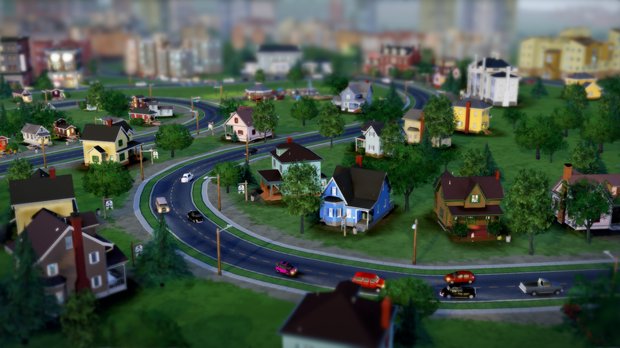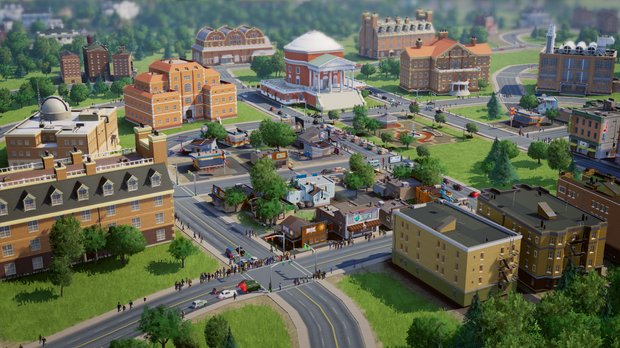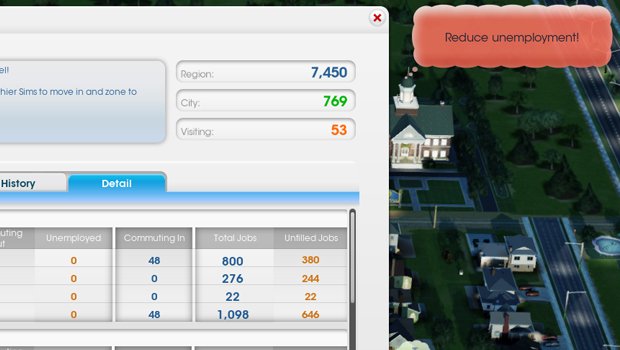GamesRadar+ Verdict
Pros
- +
Wonderful visual style
- +
Watching Sims go about their lives is great
- +
Social and online functionality is innovative
Cons
- -
Glitches sometimes destroy cities
- -
Server issues compound design flaws
- -
Small city size might be a turn off
Why you can trust GamesRadar+
SimCity, like an actual city, only succeeds when everyone and everything works together. And when that happens--when absolutely every system functions exactly as intended--it's one of the most satisfying experiences that exists in gaming. Completing basic tasks like carving streets into the world is an incredible sight to see, and watching houses pop up and populate with miniature people is met with awesome reward. SimCity, at times, is nothing short of brilliant. But its balance is a precarious one, and the moment something doesn't work--when there's even the slightest hitch--everything comes crashing down.
On its most fundamental level, SimCity has you slipping into the comfortable loafers of a mayor, tasked with drawing roads onto a plot of land, coloring around them with residential, commercial, and industrial districts, and surrounding them with government buildings. All the while, you'll need to juggle the wants of your citizens, listening to their demands and reacting to make them happy and productive. SimCity upgrades the basic city building formula at every turn in the form of beautiful visuals, curvy roads, and a new engine that completely changes how you approach building a city.

"SimCity, at times, is nothing short of brilliant."
Maxis named the engine that powers SimCity "GlassBox" because it aims to be transparent. Whereas other games hide their inner workings, GlassBox puts them on display. This transforms everything that happens, from a building fire to a power outage, into bits of helpful, actionable information. It's because of this that the result of your work is immediate and apparent. Drop a park and you can see the land value increase, causing houses to immediately upgrade to larger, fancier estates. Create a new water tower and you can see the water traveling down the streets, spreading throughout your city. The people that live in your town look alive, and you can follow them as they go to work, shop at stores, get stuck in traffic, and return home. It's remarkable, and makes it nearly impossible to stop playing once you've started.
Everything you do is instantly visualized, creating an incredible feeling of accomplishment whenever anything happens. And if something is going wrong, that's apparent, too. SimCity's a remarkably dynamic puzzle, constantly shifting and evolving to challenge you in new, fun ways. It's fulfilling to observe a problem--say, a traffic jam--and find unique ways to fix it. You'll look inside the GlassBox, analyze the issue, and resolve it, feeling as though you've truly accomplished something. But then there are times when things really go wrong, and it's here where SimCity's whimsy and brilliance fall apart.

"It's remarkable, and makes it nearly impossible to stop playing once you've started."
This applies not only to the game's servers, which were barely functional at launch due to the always-online aspect of the game (and the fact that they were overloaded), but to the basic gameplay itself. Because everything is so clear--so transparent--it's frustrating when you're given contradictory information. When one graph tells you to build more houses because there are unfilled jobs, and another one tells you there's an unemployment problem, you're inevitably going to get annoyed. Sometimes you can learn how to deal with the problems and ignore the game's advice, but it's frustrating when SimCity spends so much time screaming at you to fix things that aren't broken.
SimCity often misdiagnoses its own problems, giving you solutions that actually compound the issues. If a fire truck doesn't arrive in time to put out a blaze because it was stuck in traffic, the game may tell you to build more fire trucks--which, in actuality, will create even worse traffic. Other times, things simply break. You'll sometimes wonder why your police force or firefighters have vanished, and wonder why building new stations won't create any more. Because the game is always-online, and because there's no saved games, this can mean that your city is literally broken. Sadly, these types of problems aren't all that uncommon, and even a small glitch left unchecked can destroy hours of work.
This same system of potential toppled by issues causes problems with the game's Districts. Instead of creating massive, sprawling metropoli, you'll be building multiple small cities in a large area, breaking the zone into manageable chunks. It's a strong concept, making for more intimate, personal affairs and allowing for further specialization, as there's less pressure to turn every city into New York. You can opt to go all-in on a gambling town, focus on industry, or attempt to strike it rich by mining resources--and the ability to join into Districts with friends creates a truly social SimCity experience. While some might dislike being forced to focus on multiple small towns (or to interact with others online), make no mistake: SimCity posits creative connectivity ideas that move the sim genre forward.

"Other times, things simply break."
But just as is the case with the cities themselves, Districts crumble when things don't line up. You'll stare in confusion as your citizens refuse to take open jobs in other cities, or wonder what happened when donations you offered to neighbors fail to show up. Some of the blame can be heaped onto the game's servers, but other issues come by design--it's simply too difficult to accurately work with neighboring cities, even though it feels like the game was built around it. When Districts work well, you'll be met with the most customizable, adaptable SimCity yet. When they don't, the game is outright dysfunctional.
SimCity's a mess of moving parts, occasionally clicking into place and allowing for brilliant experiences before coming undone and tearing everything down. With updates to both server stability and the game itself, SimCity's wonderful moments may be able to overtake the bad ones to create the best game in the series. But if those don't come, EA's bustling metropolis may end up a ghost town.
More info
| Genre | Simulation |
| Description | Powered by the GlassBox Engine, the modern reboot of the classic city-builder is more lifelike than ever: The citizens of your city will actually be affected by the changes you make. |
| Platform | "Mac","PC" |
| US censor rating | "Everyone 10+","Everyone 10+" |
| UK censor rating | "","" |
| Release date | 1 January 1970 (US), 1 January 1970 (UK) |
Hollander Cooper was the Lead Features Editor of GamesRadar+ between 2011 and 2014. After that lengthy stint managing GR's editorial calendar he moved behind the curtain and into the video game industry itself, working as social media manager for EA and as a communications lead at Riot Games. Hollander is currently stationed at Apple as an organic social lead for the App Store and Apple Arcade.




